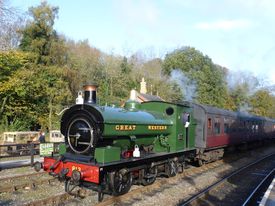GWR 813 Saddle Tank
| GWR 813 Saddle Tank | |
|---|---|
 813 at Highley in November 2016 | |
| Built By | Hudswell Clarke for Port Talbot Railway |
| Configuration | 0-6-0ST |
| Status | Out of service |
| Loco Number | 813 |
| Other Numbers | PTR 26 12, NCB 11 |
| History | |
| Built | 1900 |
| Type | ' |
| 1967 | Arrived on SVR |
| 1976 | First steamed in preservation |
| 1996 | Overhaul begun at Bridgnorth |
| 2000 | Returned to steam |
| 2009 | Withdrawn for overhaul |
| 2016 | Re-entered service |
| Technical | |
| Weight | 44t |
| Tractive effort | 17,410 lb |
| Pressure | 160 lb/sq in |
813 is an 0-6-0 saddle tank locomotive built in 1900 by Hudswell Clarke for the Port Talbot Railway Company, which later became part of the GWR. It subsequently saw service at Backworth Colliery in Northumberland. The locomotive is owned by The GWR 813 Preservation Fund.
Contents
813 in main line service
The loco was originally built for the Port Talbot Railway & Docks Company (PTR), one of nine 0-6-0 saddle tanks owned by that company. She was built by Hudswell Clarke of Leeds, works number 555 of 1900,[1] and entered service with the PTR in 1901 as number 26. Based at Duffryn Yard Depot, the locomotive was predominantly used for hauling coal trains and shunting in colliery sidings on the PTR's network.[2]
In 1908 the GWR agreed to operate the PTR's trains and maintain their locos. As the PTR was still legally independent their locos were not fully absorbed into the GWR stock list, but with the GWR responsible for maintenance number 26 started to receive GWR standard parts to replace those originally fitted by Hudswell Clarke. The GWR took over the PTR completely in 1922, and shortly afterwards 26 went to Swindon for overhaul, returning in 1924 as number 813. With the GWR keen to phase out non-standard locos from its fleet, 813 was withdrawn and put up for sale in 1933.
813 in industrial service
After 9 months on the GWR sales list, 813 was sold to Robert Stephenson & Company, who sold her on to Backworth Collieries Limited in Northumberland. Backworth renumbered her as number 12 and she survived to be passed to the NCB with the nationalisation of the coal industry in 1947. In 1950, she received a new boiler from her original manufacturers Hudswell Clarke, and was renumbered as NCB 11. A new firebox followed in 1962, only five years before the NCB withdrew her from service.
813 in preservation
The loco arrived on the SVR on the 25th November 1967. Following cosmetic restoration she appeared as a static exhibit at Rail 150 in 1975, and briefly returned to steam in 1976. However it was quickly found that further restoration work was required. The loco was able to steam again in 1984, and visited Didcot as part of the GW150 celebrations, but again suffered from mechanical problems and was taken out of service. The loco was stored out of use until 1996, before undergoing a thorough overhaul and rebuilding at Bridgnorth. She successfully returned to steam in summer 2000. Despite her small size, she was pressed straight into service on the SVR due to a temporary loco shortage.
After returning to steam, 813 visited many other railways around Britain before being withdrawn in 2009 for her next major overhaul at Bridgnorth Loco Works. This was completed by August 2016 and, after test runs, 813 was moved to Kidderminster for painting in September,[3] and to Bridgnorth on 8 October for signwriting.[4] The locomotive then featured in the Season Finale Gala held over the first weekend of November 2016.
At the end of 2019, 813 had recorded a total of 17,269 miles in preservation on the SVR. The reported total may include mileage on hire to other railways.[5]
813 suffered from leaking boiler tubes during the 2021 Autumn Steam Gala and was withdrawn on the Friday of that event. A retube followed.[6]
During the 2022 Spring Steam Gala 813 suffered a failure of the grey iron casting that forms part of the rear spring housing under the coal bunker. It was unable to attend as planned the South Devon Railway 150 celebration, and a hire period at The Embsay and Bolton Abbey Railway. The failure required the casting to be removed at Bridgnorth and The Boro' Foundry at Lye, Stourbridge engaged to assist in producing a new pattern, make a new casting in spheroidal graphite iron, and machine it.[7] The GWR 813 Fund Trustees launched a Crowdfunder appeal which raised around £2,250 of the estimated £15,000 cost.[8]
Reassembly took place at Bridgnorth in Spring 2024.[9] However, previous internal patches and filler repairs of the saddle tank were found to be no longer sound and numerous leaks occurred, so the tank was deemed to have succumbed to corrosion and old age. As of 2024[update] the loco is out of service as it is in need of a new tank. Options are being explored to return the loco to traffic[10].
Taffy nameplate
Around 2000 the locomotive carried wooden 'Taffy' nameplates[11].
Gallery
See also
References
- ↑ UKLocos database
- ↑ SVR News 174
- ↑ SVR Online Forum
- ↑ GWR 813 Fund 'In Steam 2016'
- ↑ SVR News 210, SVR-based Steam Locomotive Mileage 2017-2019, Duncan Ballard
- ↑ Branch Lines, October 2021
- ↑ SVR News 220
- ↑ National Preservation Forum (retrieved 1 June 2023)
- ↑ Branch Lines, March 2024
- ↑ Branch Lines April 2024
- ↑ Dave Hill photograph of 813 at Highley on 2 September 2000 posted on Facebook, 4 May 2020 (Retrieved 4 May 2020)
Links
Loco history page on GWR 813 Preservation Fund website
| ||||||||||||||||||||||||||||||||||||||||||||||||||||||||


